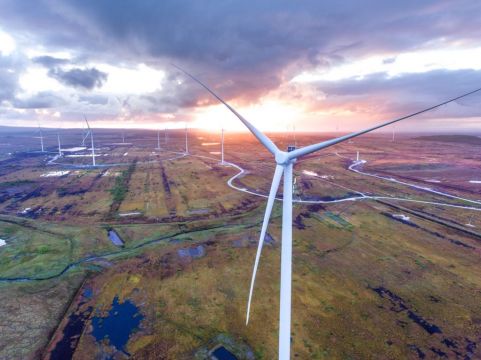As the Government is due to publish the much anticipated Climate Action Plan, one of the leading wind energy companies in the world has pulled out of the Irish market, The Irish Examiner reports.
It is understood that the Norwegian company Equinor, who was in partnership with the Electricity Supply Board (ESB) since 2019, has pulled out of Ireland due to dissatisfaction with the regulatory and planning regime that currently exists for offshore energy development.
However, the Government is "not too perturbed" at the major blow to the plans, according to the Minister for Expenditure Michael McGrath.
"We are determined to make our planning and regulatory system fit for purpose for offshore renewable wind energy," Mr McGrath told Newstalk.
"We see enormous potential in this area, and it will make a very important contribution to reaching the overall level of 80 per cent of our electricity needs be met by renewable sources," he said.
"There is a need to change the regulatory and the planning system. We are doing that. We have legislation going through the Oireachtas at the moment - The Maritime Area Planning Bill, which for the first time will have a dedicated system in place to address planning issues in respect of all maritime matters, including offshore renewable energy.
"We will be backing that up with investment. We will have a renewable energy auction next year in this area, and we do expect by 2025 we will see actual offshore renewable developments in place."
Mr McGrath also commented that Equinor is only one company "and there are many, many companies who are very eager to get into the Irish market because they recognise the competitive advantage we have and the natural assets we have in relation to offshore renewable energy".
The Norwegian company had been working with the ESB with the aim of delivering a significant amount of the 80 per cent electricity which the State hopes to generate from renewable sources by 2030.
It had been announced last April that the companies were set to develop a major 1.4GW offshore wind farm near Moneypoint in Co Clare. The development was to cost €2 billion.
It is understood this particular facility was expected to produce enough energy to power 1.5 million households. However, it is unclear if a lack of progress in this project influenced Equinor to pull out of the partnership.
Commitment to offshore projects
Equinor had contacted the ESB in recent weeks to state its decision to pull out. However, in a statement issued in response to the collapsed partnership, the ESB said it is still fully committed to developing a major portfolio of offshore projects.
“Following a review by Equinor of its strategy to develop profitable growth in renewables they decided to stop their early phase offshore wind activities in Ireland, in part due to local regulatory uncertainty,” the ESB said in a statement.
"Equinor has conveyed that they were very impressed with ESB’s professionalism and capability and that they wish ESB every success as they continue to develop a portfolio of offshore wind projects in Irish waters."
According to the ESB, the companies had worked closely to develop a portfolio of offshore projects for various locations across the State.

“Significant preparation work, including foreshore licence applications, has been completed and ESB believes that these projects will make an important contribution to the Programme for Government’s target of 5GW [gigawatts] of offshore wind by 2030,” the statement said.
In a statement to The Irish Examiner, a spokesperson for the Minister for Climate Action Eamon Ryan said the Maritime Area Planning Bill, which covers offshore renewable energy in Ireland, is due to be enacted by the end of the year.
"There will be an offshore energy auction in 2022, and we expect to see projects built by 2025. We note the decision of this company to exit the market. However, there are dozens of others competing to develop Ireland's competitive advantage in offshore wind," the spokesperson said.
Sources in the sector have told The Irish Examiner that there are serious problems with the regulatory regime as applications for development pile up while the new Maritime Area Planning Bill is still going through the Oireachtas.







